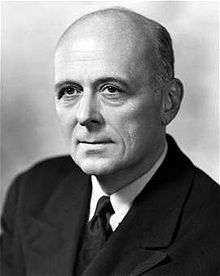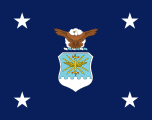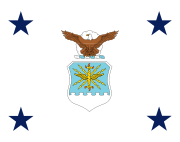Thomas K. Finletter
Thomas Knight Finletter (November 11, 1893 – April 24, 1980), was an American lawyer, politician, and statesman.
Thomas Finletter | |
|---|---|
 | |
| United States Ambassador to NATO | |
| In office March 2, 1961 – September 2, 1965 | |
| President | John F. Kennedy Lyndon B. Johnson |
| Preceded by | William Draper |
| Succeeded by | Harlan Cleveland |
| United States Secretary of the Air Force | |
| In office April 24, 1950 – January 20, 1953 | |
| President | Harry S. Truman |
| Preceded by | Stuart Symington |
| Succeeded by | Harold E. Talbott |
| Personal details | |
| Born | Thomas Knight Finletter November 11, 1893 Philadelphia, Pennsylvania, U.S. |
| Died | April 24, 1980 (aged 86) New York City, New York, U.S. |
| Political party | Democratic |
| Education | University of Pennsylvania (BA, LLB) |
| Military service | |
| Branch/service | United States Army |
| Rank | Captain |
Early life
Finletter was born in Philadelphia, Pennsylvania, the son of Thomas Dickson Finletter and Helen Grill Finletter. He was the grandson of Thomas K. Finletter, for whom the Thomas K. Finletter School in Philadelphia is named. [1]
He took his early education at The Episcopal Academy in Philadelphia and graduated from the University of Pennsylvania with both Bachelor of Arts degree in 1915 and bachelor of laws in 1920. He also served as editor-in-chief of the University of Pennsylvania Law Review.
Career
In World War I, he served with the 312th Field Artillery advancing to the rank of captain. He was admitted to the Pennsylvania bar in 1920 and the New York Bar in 1921.
Finletter practiced law in New York until he began his government service in 1941, as a special assistant to Secretary of State Cordell Hull on international economic affairs. In 1943, he was appointed executive director and later deputy director of the Office of Foreign Economic Coordinator (OFEC). In this post, he was in charge of planning economic activities related to liberated areas and was in control of matters of foreign exchange and matters relating to the operations of the Alien Property Custodian. Finletter resigned his post in 1944, when the functions of OFEC were absorbed by the newly created Foreign Economic Administration.
In 1945, Finletter acted as consultant at the United Nations Conference on International Organization at San Francisco.
In the same year he was a cosigner of the "Declaration of the Dublin, N.H., Conference", a declaration on world peace issued by the Dublin Conference on World Peace. The declaration stated that the United Nations was inadequate to maintain world peace, and advocated a world federal government.
He returned to public service July 18, 1947, when President Harry S. Truman established a temporary, five-man commission that inquired into all phases of aviation and drafted the national air policy report. This commission was sometimes known as "The Finletter Commission". Finletter served as chairman of the Air Policy Commission which, on January 1, 1948, sent to the president the report entitled "Survival in the Air Age."
Finletter was chief of the Economic Cooperation Administration's mission to the United Kingdom with headquarters in London, to which he had been appointed early in 1949.
Secretary of the Air Force
President Truman appointed Finletter as the second Secretary of the Air Force succeeding Stuart Symington on April 24, 1950, in which office he served until January 20, 1953.
In 1958, Finletter was a candidate for the Democratic nomination for the U.S. Senate from New York. He won the support of some liberal reformers, prominently including Eleanor Roosevelt,[2] and was chosen as the Liberal Party's candidate, but the Democratic Convention preferred Frank Hogan. Finletter then withdrew from the Liberal ticket, endorsing Hogan.[3]
Diplomatic service
President John F. Kennedy appointed Finletter to be the Ambassador to NATO to succeed William Henry Draper Jr. in 1961. He served in that office until 1965 when he was replaced by Harlan Cleveland.
Later life
In 1965, following his term as Ambassador to NATO, he retired from government service and returned to his law practice with the firm of Coudert Brothers, in New York City. In January of 1967, he approached Senator Eugene McCarthy to see if he was interested in challenging Lyndon Johnson for the 1968 Democratic nomination for president, on the issue of the Vietnam War.[4] McCarthy did go on to challenge Johnson, but failed to win the Democratic nomination. Finletter died on April 24, 1980.
Book
- Interim Report on the U.S. Search for a Substitute for Isolation, W.W. Norton & Co., Inc., New York: 1968
Political and Professional Affiliations
- Americans for Democratic Action
- Council on Foreign Relations
- United World Federalists
- Delta Phi
See also
Notes
- http://www.gwu.edu/~erpapers/myday/displaydoc.cfm?_y=1958&_f=md004182
- Egan, Leo (29 August 1958). "FINLETTER BARS RACE AS LIBERAL; Urges Party to Back Hogan for Senator -- Decision to Be Made Next Week FINLETTER BARS RACE AS LIBERAL". The New York Times. Retrieved 30 May 2018.
- Sandbrook, Dominic. Eugene McCarthy and the Rise and Fall of Postwar American Liberalism. p. 165.
References
External links
| Political offices | ||
|---|---|---|
| Preceded by Stuart Symington |
United States Secretary of the Air Force 1950–1953 |
Succeeded by Harold E. Talbott |
| Diplomatic posts | ||
| Preceded by William Draper |
United States Ambassador to NATO 1961–1965 |
Succeeded by Harlan Cleveland |

